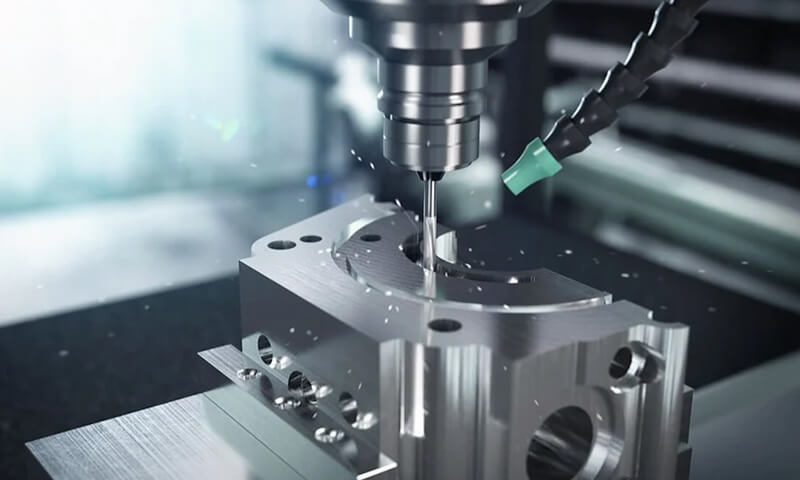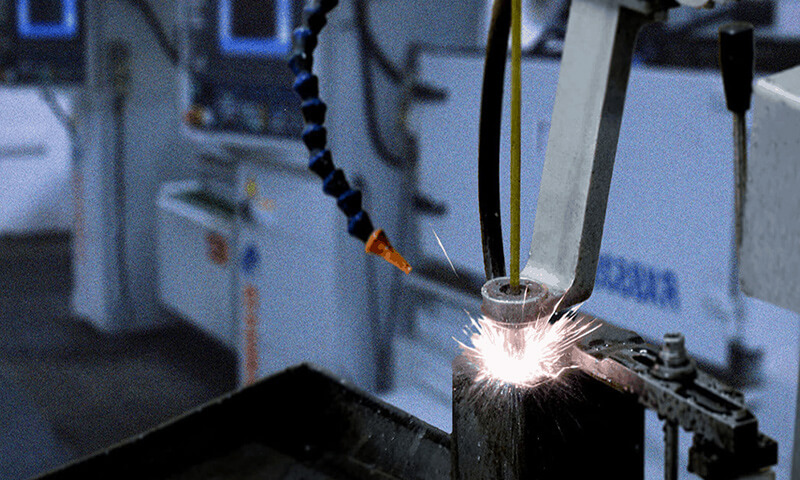Dator numerisk kontroll (Cnc) maskiner har revolutionerat tillverkningsindustrin, ger oöverträffad precision, repeterbarhet, och effektivitet. Att förstå de olika typerna av CNC-maskiner och deras funktionalitet är avgörande för att välja rätt verktyg för ett specifikt projekt eller affärsbehov. Denna omfattande guide kommer att utforska olika typer av CNC-maskiner, deras kategorier, och hur du väljer den bästa typen för dina behov.
Vad är en CNC-maskin?
En CNC (Dator numerisk kontroll) maskin är en programmerbar enhet som automatiserar tillverkningsprocessen genom att kontrollera rörelsen av verktyg och delar med hjälp av CAD (Datorstödd design) och CAM (Datorstödd tillverkning) programvara för att konvertera designfiler till instruktioner som styr maskinens rörelse.
CNC-maskiner kan utföra en mängd olika operationer med hög precision och repeterbarhet, möjliggör massproduktion och tillverkning av komplexa delar. CNC-maskiner används ofta inom bilindustrin, flyg-, elektronik, medicinsk, och andra industrier.
Grundläggande element i CNC-maskinsystemet
Ett CNC-maskinsystem innefattar vanligtvis följande element:
- Kontroller: CNC-maskinens hjärna som läser och tolkar G-kod (maskinspråket) för att kontrollera maskinens rörelser.
- Drivsystem: Innehåller motorer och förstärkare som utför styrenhetens kommandon.
- Maskingränssnitt: Human Machine Interface (HMI) att mata in kommandon och övervaka operationer.
- Skärverktyg: Pinnfräsar, borrar, syrer, och andra verktyg som används för att skära och forma material.
- Feedback System: Ger realtidsdata om maskinens prestanda för exakt positionering och felkorrigering.
Olika typer av CNC-maskiner
Det finns olika typer av CNC-maskiner, var och en utformad för specifika uppgifter:
1. Fräs CNC-maskin:
-
- Fungera: Använder roterande skärverktyg för att ta bort material från ett stationärt arbetsstycke, idealisk för att skapa plana ytor, hål, och fickor.
- Ansökningar: Lämplig för att skapa komplexa former och intrikata mönster i en mängd olika material.
- Begränsning: Storleken den kan bearbeta beror på kapslingens storlek som rymmer maskinen och den största sträckan som skärverktygen kan färdas.

2. Vrid CNC-maskin:
-
- Fungera: Även känd som CNC-svarvar, dessa maskiner roterar arbetsstycket medan skärverktyg formar det, perfekt för cylindriska komponenter som axlar, bussningar, och bultar.
- Ansökningar: Används vanligtvis för svarvning av material som metaller och plaster.
- Begränsning: På grund av hur denna maskin tillverkar produkter, det är bättre att göra symmetriska delar.
3. Slipande CNC-maskin:
-
- Fungera: Använder en slipskiva för att jämna ut och ytbehandla ytor, används ofta vid efterbehandling för hög precision och ytkvalitet.
- Ansökningar: Används för efterbearbetning och skapar extremt fina toleranser.
- Begränsning: De CNC-slipmaskin tar bort material från ett arbetsstycke i mycket långsam takt. Det är därför den främst används som en efterbehandlings- eller utjämningsmaskin.
4. CNC-borrmaskin:
-
- Fungera: Designad för att skapa runda hål med roterande borr; kombineras ofta med gängning för att trä hålen.
- Ansökningar: Används vanligtvis för att skapa exakta hål i olika material.
- Begränsning: En stor begränsning hos maskinen är dimensionen på hålet den kan skapa. Det är utmanande att skapa hål som är djupa eller tillräckligt stora utan specialiserade borrkronor.
5. EDM (Elektrisk urladdningsmaskin):
-
- Fungera: Använder elektriska urladdningar för att erodera material från ett arbetsstycke, möjliggör skapandet av komplexa former som är svåra att uppnå med traditionella skärverktyg. Den utför beröringsfri bearbetning, gör att den kan arbeta med delar av vilken hårdhet som helst.
- Ansökningar: Lämplig för att bearbeta hårda material och producera intrikata funktioner.
- Begränsning: EDM är begränsad till ledande material, vilket gör den olämplig för icke-ledande material som keramik, trä, och plast.

6. CNC-maskin för plasmaskärning:
-
- Fungera: Skär material med en högtemperatur plasmabrännare, lämplig för elektriskt ledande material som stål och aluminium.
- Ansökningar: Idealisk för skärning av stål och andra ledande material.
- Begränsning: Dessa maskiner producerar enorm värme när de skär material genom att smälta dem. Denna värme påverkar ofta ytfinishen på det skurna materialet, vilket resulterar i värmepåverkade zoner. En annan begränsning är att denna maskin har ett begränsat utbud av material som den kan skära, eftersom det bara skär genom metaller och andra ledande legeringar.
7. CNC-maskin för vattenskärning:
-
- Fungera: Använder en högtrycksvattenstråle blandad med slipmedel för att skära material utan att alstra värme, perfekt för att skära tjocka och värmekänsliga material.
- Ansökningar: Mångsidig skärlösning lämplig för gummi, läder, glasfiber, kretskort, skumma, papper, keramisk, glas, sten, och plåt.
- Begränsning: En av de största nackdelarna är att vattenskärhastigheten är långsammare än andra skäralternativ. Denna lägre hastighet är särskilt uppenbar runt de böjda skären och hörnen.
8. Laserskärande CNC-maskin:
-
- Fungera: Använder en fokuserad laserstråle för att skära eller gravera material med hög precision. Laserstrålen skär genom materialen oavsett deras ledningsförmåga för att skapa den önskade produkten eller formen.
- Ansökningar: Används vanligtvis för skärning av metaller, plast, trä, och tyger.
- Begränsning: En av begränsningarna för en laserskärande CNC-maskin är den maximala tjockleken på 2,75 tum på materialet du kan skära med den.
9. CNC-routermaskin:
-
- Fungera: Används ofta för att kapa trä, plast, och mjukare material, CNC-routrar har en roterande spindel med hög hastighet för jämna ytbehandlingar.
- Ansökningar: Lämplig för skyltning, skåp, och dekorativt arbete.
- Begränsning: Den övergripande driften av CNC-routermaskinen kan vara ganska bullrig på grund av dess olika komponenter.
10. Fleraxlig CNC-maskin:
-
- Fungera: Fleraxliga CNC-maskiner kan röra sig i fyra eller flera riktningar, jämfört med en två- eller treaxlig maskin, fleraxlig bearbetning är mer komplex och ger mer exakta detaljer. De erbjuder bättre flexibilitet och sträcker sig från 4-axliga upp till 12-axliga konfigurationer.
- Ansökningar: Idealisk för komplexa delar som kräver bearbetning från flera vinklar.
- Begränsning: Dessa maskiner skiljer sig markant från 2 och 3-axliga typer och behöver ofta skickliga operatörer för optimal prestanda.
11. 3D Skrivare:
-
- Fungera: En typ av CNC-maskin som bygger delar lager för lager från en digital fil, använda material som plast, hartser, och metaller.
- Ansökningar: Används ofta i prototypframställning, tillverkning, och skräddarsydd produktskapande.
- Begränsning: Kostnaden för att anskaffa denna CNC-utrustning och att tillverka komponenter med denna process är ganska höga. Också, 3D utskriftshastigheten är låg, speciellt när det används för massproduktionsprocesser.

12. CNC automatisk verktygsväxlare:
-
- Fungera: Även känd som ATC, förbättrar produktiviteten genom att tillåta flera verktyg att användas i en och samma installation utan manuellt ingripande.
- Ansökningar: Förbättrar produktiviteten och minskar stilleståndstiden i produktionsmiljöer.
- Begränsning: Hög felfrekvens, långa verktygsbytestider, verktygsmagasinets kapacitet är liten.
Typer av CNC-maskiner efter antal koordinataxlar
CNC-maskiner kan kategoriseras baserat på antalet koordinataxlar de arbetar:
2-Axis CNC-maskiner:
2-Axis CNC-maskiner är den enklaste typen, verkar längs X (horisontell) och Y (vertikal) yxor. De används vanligtvis för raka snitt, borra hål, eller bearbeta en enda yta utan att flytta om arbetsstycket.
3-Axis CNC-maskiner:
De vanligaste CNC-maskinerna är 3-axliga modeller, som lägger till en Z-axel för djup till standard X- och Y-axlarna. De arbetar på stationära arbetsstycken och kan hantera uppgifter i 2.5 mått, vilket gör dem mångsidiga för grundläggande bearbetning.
4-Axis CNC-maskiner:
Dessa maskiner inkluderar en A-axel, som tillåter rotation längs X-axeln, förutom X, Y, och Z-axlar. Denna funktion är idealisk för uppgifter som utskärningar och bågskärning.
5-Axis CNC-maskiner:
5-axel CNC-maskiner introducerar en C-axel, så att skärverktyget kan svänga. Denna inställning möjliggör bearbetning av fem ytor samtidigt, producerar mycket exakta delar idealiska för medicinsk utrustning.
7-Axis CNC-maskiner:
7-axelmaskiner har tre axlar för rotation av arbetsstycket, tre för verktygsrörelse, och en extra E-axel för armrotation. Deras förmåga att skapa komplexa delar gör dem lämpliga för flyg, medicinsk, och militära komponenter.
9-Axis CNC-maskiner:
Kombinera en 5-axlig fräsmaskin och en 4-axlig svarv, 9-Axis CNC-maskiner hanterar både interna och externa delar effektivt. De används ofta för tillverkning av tandimplantat, medicinska verktyg, och avancerade flyg- och rymdkomponenter.
12-Axis CNC-maskiner:
Dessa maskiner har två skärhuvuden, var och en kan röra sig längs X, Y, Z, En, B, och C-axlar. Denna konfiguration möjliggör snabbare produktion med exceptionell precision, idealisk för hög volym, komplicerade bearbetningsuppgifter.
Typer av CNC-maskiner uppdelade efter servosystem
CNC-maskiner kan också klassificeras utifrån deras servosystem:
Öppna Loop Control System: Grundläggande styrsystem utan återkopplingsmekanism; lägre kostnad men mindre precision.
Halvsluten slinga kontrollsystem: Använder viss feedback för att rätta till fel; ett mellanvägsalternativ för kostnad och precision.
Closed-loop kontrollsystem: Avancerat system med full feedback, erbjuder hög precision och minimala fel.
Typer av CNC-maskiner enligt Moving Trail
Olika CNC-maskiner är utformade för att följa specifika vägar:
Punktkontroll: Styr start- och slutpunkterna för verktygsbanan, fokusera på positionering snarare än vägen.
Linjär kontroll: Säkerställer linjär rörelse mellan punkter, används ofta för borrning och tappning.
Konturstyrning: Styr verktygsbanan kontinuerligt, möjliggör skapandet av krökta eller konturerade ytor.
Hur man väljer den bästa CNC-maskintypen?
När du väljer rätt CNC-maskin för ditt företag, flera faktorer måste beaktas. Den idealiska maskinen beror på din verksamhets karaktär, vilken typ av produkter du tillverkar, och produktionens omfattning. Här är viktiga överväganden för att välja en CNC-maskin:
Affärstyp
Den typ av företag du driver kommer att avsevärt begränsa dina val. För en liten CNC-butik, några CNC-routrar kan räcka. Omvänt, en storskalig tillverkning kan kräva större, mer mångsidiga multifunktionella CNC-maskiner.
Tillgänglighet av reservdelar
CNC -maskiner, som all annan utrustning, kan slitas ut eller gå sönder. Det är viktigt att välja ett märke eller en modell som dina tekniker enkelt kan reparera, med reservdelar lätt tillgängliga. Tillgången på delar påverkar direkt stilleståndstiden och hur snabbt produktionen kan återupptas.
Produktkrav
Vilken CNC-maskin du behöver beror till stor del på komplexiteten hos de produkter du tillverkar. Enkla produkter kräver kanske bara en CNC-svarv eller en 3-axlig fräsmaskin. Dock, för mer komplexa föremål, en 5-axlig CNC-maskin som kan utföra flera operationer i en uppställning skulle vara mer effektiv. Specialiserade maskiner, som schweiziska svarvar, är idealiska för att producera stora volymer av små, invecklade cylindriska delar.
Strömkrav
CNC-maskiner förbrukar i allmänhet mycket ström, kräver ofta trefaseffekt för att fungera effektivt. Det är avgörande att säkerställa att din anläggning kan tillhandahålla den nödvändiga kraften för all ny CNC-utrustning. Du bör också bedöma nuvarande strömförbrukning för att undvika att överträffa din strömförsörjningskapacitet när du lägger till nya maskiner.
Material som ska bearbetas
Materialet du planerar att bearbeta är en kritisk faktor. Maskiner måste vara tillräckligt robusta för att exakt fräsa hårda legeringar. Å andra sidan, mjukare material som mjukt stål behöver kanske bara precisionsmaskiner som kan bibehålla de erforderliga toleranserna.
Genom att beakta dessa faktorer, du kan välja en CNC-maskin som bäst passar dina produktionsbehov och affärskrav.
DETTA: CNC-bearbetningstjänst för varje CNC-projekt
DEZE erbjuder omfattande CNC-bearbetningstjänster för att tillgodose alla dina behov, från fräsning och svarvning till avancerad fleraxlig bearbetning. Vi arbetar nära våra kunder för att leverera precisionskonstruerade detaljer med olika ytfinish och högkvalitativa material.
Så varför vänta? Kontakta oss idag, så att vi kan börja arbeta med dina CNC-projekt.
Innehållsreferens:https://waykenrm.com/blogs/types-of-cnc-machines/
Vanliga frågor
Q: Vad är den största fördelen med att använda CNC-maskiner?
En: CNC-maskiner erbjuder hög precision, repeterbarhet, och automatisering, vilket gör dem idealiska för komplexa och stora tillverkningsuppgifter.
Q: Kan CNC-maskiner arbeta med vilket material som helst?
En: CNC-maskiner kan arbeta med en mängd olika material, inklusive metaller, plast, trä, och kompositer. Den specifika maskin och verktyg som används beror på materialet som bearbetas.
Q: Vad är skillnaden mellan 3-axliga och 5-axliga CNC-maskiner?
En: 3-Axis CNC-maskiner fungerar i tre dimensioner (X, Y, Z), medan 5-axliga CNC-maskiner lägger till ytterligare två axlar för rotation, möjliggör mer komplexa och flersidiga bearbetningsoperationer.
Q: Är CNC-maskiner lämpliga för småföretag?
En: Ja, CNC-maskiner kan vara fördelaktiga för småföretag, speciellt med tanke på effektiviteten och precisionen de erbjuder. Kompakta och prisvärda alternativ finns tillgängliga för mindre skala.
Q: Vad är skillnaden mellan open-loop och closed-loop CNC-maskiner?
En: Open-loop-system saknar återkopplingskontroll, medan slutna system ger realtidskorrigeringar för högre noggrannhet.



